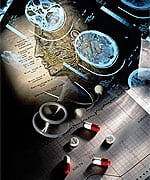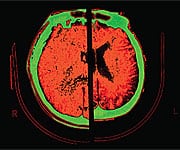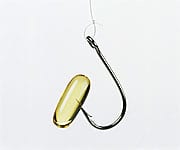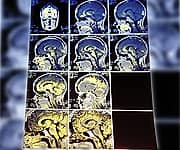Life Extension Magazine®
If the threat of a heart attack is not enough to compel Americans to trade in their cheeseburgers and recliners for salmon and exercise bikes, how about mounting evidence that cardiovascular disease may greatly increase one’s risk of developing mind-destroying Alzheimer’s disease? As scientists delve further into the twin pathologies of cardiovascular disease and dementia, they are increasingly convinced that afflictions of the heart and brain share common triggers and biochemical characteristics, including inflammation, oxidative stress, and hypoxia, an oxygen deficit caused by impaired blood flow. Fortunately, many nutritional and botanical agents that have shown great efficacy in preventing and treating cardiovascular disease also appear to work via several important mechanisms to preserve healthy cognitive function and ward off the crippling effects of Alzheimer’s and other forms of senile dementia. In this article, we examine the growing evidence indicating that cardiovascular disease may greatly increase one’s likelihood of developing Alzheimer’s, as well as strategies you can adopt today to safeguard the health of your heart and your mind. Twin Afflictions of Heart Disease and Alzheimer’sThe latest data show that more than 60 million Americans suffer from some form of heart disease, including coronary artery disease, congestive heart failure, and cardiac arrhythmias (abnormal rhythms of the heart). Coronary artery disease in particular affects more than 13 million Americans.1 Although heart disease traditionally has been thought of as a “man’s disease,” nearly half of the 600,000 Americans who will die from heart disease this year are women. With its alarming growth rate and lack of a cure, Alzheimer’s disease is poised to become one of the most insidious medical problems of the twenty-first century. This devastating neurological condition progressively destroys one’s memory and ability to think. Alzheimer’s now affects more than 5 million Americans, including one of eight Americans aged 65 or older and nearly half of those over the age of 85. Someone in the United States develops Alzheimer’s every 72 seconds, and according to current projections, by 2050 a new case of Alzheimer’s disease will emerge every 33 seconds.2-4
Alzheimer’s Destroys Memory in Multiple WaysWhile scientists have not yet been able to pinpoint the exact cause of Alzheimer’s, they have been able to elucidate some of the biochemical processes that produce the hallmark mental changes characteristic of the disease. First, Alzheimer’s involves a significant decline in brain levels of acetylcholine, a neurochemical that is vitally important for memory formation and retention. Second, the disease is accompanied by an accumulation of harmful amyloid-beta deposits, or senile plaques, in the brain. Third, brain autopsies of Alzheimer’s patients show evidence of substantial oxidative damage wrought by free radicals. When energy is generated, free radicals are produced in every cell in the body, particularly brain cells; however, in Alzheimer’s disease, free radicals are produced in much greater amounts then normal, leading to significant damage to the brain. In a recent article on this topic in the Annals of the New York Academy of Sciences, the investigators concluded that “altogether, our findings emphasize the importance of . . . oxidative stress in the pathogenesis of [Alzheimer’s disease].” 5 Deadly Connections: Hypoxia, Amyloid-Beta, and Oxidative StressWhile researchers certainly know much more today about how Alzheimer’s affects the brain, we still do not know why this disease afflicts some people and spares others. However, groundbreaking research strongly suggests an intimate link between Alzheimer’s and cardiovascular diseases such as atherosclerosis, hypertension, and stroke. A recent report in the Proceedings of the New York Academy of Sciences has shown that hypoxia—the reduction in oxygen received by the brain due to decreased blood flow—may be a “trigger” that contributes to the pathogenesis of Alzheimer’s disease.7 The authors of this important research have shown that hypoxia increases the activity of a gene called BACE1, which is involved in the production of damaging amyloid-beta plaques found in the brains of Alzheimer’s patients. The researchers found that hypoxia markedly increased amyloid-beta deposition and plaque formation in central neurons. Since a decrease in the amount of oxygen delivered to the brain may very well set off a cascade of events that culminates in Alzheimer’s disease, conditions like heart disease—a cause of brain hypoxia—provide a stark connection between heart disease and Alzheimer’s. Besides increasing amyloid-beta production, hypoxic conditions in the brain also heighten levels of oxidative stress, an increase that poses serious dangers for the delicate cells of the central nervous system. Scientists believe that chronic oxidative stress may cause neuronal cell death, which ultimately manifests as the cognitive impairment and brain pathology known as Alzheimer’s disease.8 Finally, hypoxia caused by heart disease may also contribute to the lower levels of acetylcholine observed in Alzheimer’s disease.
Drugs Fail to Correct Hypoxic DamageSince healthy acetylcholine levels are critically important for memory formation and retention, it is not surprising that most prescription medications currently used to treat Alzheimer’s disease work by increasing this important neurotransmitter. Although they modestly decrease the rate of progression of Alzheimer’s, these medications—known as acetylcholinesterase inhibitors, such as Aricept® (donepezil) and Exelon® (rivastigmine)—do not stop the disease. In addition, these medications can have numerous unpleasant side effects, including nausea, vomiting, diarrhea, and liver damage.10 Another medicine, Namenda® (memantine), targets NMDA (n-methyl-D-aspartate) receptors in the brain, rather than acetylcholine.10 However, like the acetylcholinesterase inhibitors, Namenda® is not a cure, and does nothing to help decrease oxidative stress or the formation of amyloid-beta, two hallmarks of Alzheimer’s disease that are strongly influenced by hypoxia. With newly emerging evidence showing direct links between cardiovascular disease and Alzheimer’s, it makes perfect sense to use preventive therapies that target both diseases. Although there is currently no approved prescription medication that can accomplish this, a wealth of scientific evidence shows that nutritional and botanical remedies may help prevent and manage both diseases. Antioxidants Reduce Oxidative StressConsiderable evidence now shows that antioxidants may help protect against a variety of illnesses, including heart disease, cancer, and neurodegenerative disease.11,12 Since oxidative damage to brain cells is thought to contribute directly to Alzheimer’s disease, it follows that antioxidant supplements may play a vital role in preventing Alzheimer’s disease and other forms of dementia. For example, a large study of 442 elderly patients in Basel, Switzerland, found a direct correlation between higher blood levels of two common antioxidants (beta-carotene and vitamin C) and memory retention.13 Another study published in 2005, which reported on the risk of Alzheimer’s disease in people who took antioxidant supplements, found that individuals who supplemented with both vitamin E and vitamin C displayed a decreased incidence of Alzheimer’s disease.14 An even more recent study examined the protective action of vitamin E on hypoxia-induced changes in the brains of rats.15 Administering vitamin E prior to experimentally induced hypoxia provided significant brain protection and helped stabilize membrane lipids, an essential component of a healthy brain.
Resveratrol: Benefits for the Brain and HeartIn addition to antioxidants such as beta-carotene, vitamin C, and vitamin E, other nutritional agents with substantial antioxidant properties have shown efficacy against heart disease and Alzheimer’s disease. One of the most intriguing of these is resveratrol. Technically, this compound is a flavonoid polyphenol found in the skin and seeds of grapes, as well as in red wine.
Resveratrol is thought to underlie the “French Paradox,” which refers to the traditionally low levels of heart disease found in France, despite a population renowned for its love of wine and fatty foods. Recent studies have shown that daily consumption of red wine helps offset the deleterious health effects of the French diet and lifestyle, with resveratrol maintaining heart heath by preventing aberrant heart rhythms, increasing levels of beneficial high-density lipoprotein (HDL), inhibiting platelet aggregation, increasing levels of an important vasodilator (nitric oxide), quenching free radicals, and decreasing inflammation.16,17 Recent research has shown that resveratrol not only guards against heart disease, but also may provide important protection against Alzheimer’s. A study in 2003 examined the protective effect of black grape skin extract (which is high in resveratrol) on human endothelial cells that were exposed to oxidative stress similar to that produced by amyloid-beta.18 The grape skin extract protected cells against free-radical-induced damage, leading the researchers to conclude that resveratrol may help protect against amyloid-beta-induced neurotoxicity. A study published in the journal Gerontology examined resveratrol’s effects on human cells subjected to oxidative stress generated by amyloid-beta.15 Resveratrol was effective in restoring levels of glutathione (an intracellular scavenger of free radicals) in human cells subjected to amyloid-beta. In another recent study, resveratrol helped protect brain cells in the hippocampus (an area of the brain crucial for memory) against hypoxia-induced damage by substantially decreasing hypoxia-induced cell death.16 Yet another intriguing laboratory study showed that administering resveratrol to cells decreased their secretion and intracellular levels of amyloid-beta peptides. Resveratrol did not inhibit the production of amyloid-beta, but instead promoted its intracellular degradation. Although preliminary, these findings suggest a potential role for resveratrol in fighting the accumulation of amyloid-beta plaques in the brains of Alzheimer’s sufferers.21 Ginkgo Provides Multifaceted Neuroprotection
Another supplement that I have recommended to many of my patients as a front-line agent in the fight against Alzheimer’s is Ginkgo biloba. Ginkgo has been used for at least 5,000 years in the management of numerous health concerns, including age-related memory loss.22 Multiple studies have demonstrated that ginkgo extracts can provide remarkable protection against some of the most common pathological changes seen in the brains of Alzheimer’s patients. As noted earlier, maintaining optimal levels of acetylcholine is one way to fight Alzheimer’s disease. A report published in 2000 showed that standardized ginkgo extract promotes the uptake of the acetylcholine precursor choline in an area of the brain associated with memory function. Furthermore, the ginkgo extract protected the brain against the age-related loss of cholinergic neurons, which communicate using acetylcholine.23 In addition, multiple studies have been shown that ginkgo extracts can protect brain cells against amyloid-beta-induced death.24,25 Ginkgo extracts also confer powerful antioxidant properties. Recent studies have shown that standardized ginkgo extract effectively increased levels of antioxidant enzymes in the hippocampus, the brain’s essential memory center. This likely has the effect of protecting against the free-radical-induced damage that is so prevalent in the brains of Alzheimer’s sufferers.26 Other recent studies have demonstrated ginkgo’s effectiveness in protecting against hypoxia-induced brain damage.27,28 In one study, ginkgo extract protected the brain cells of gerbils against damage from experimentally induced hypoxia.27 This finding led the researchers to conclude that ginkgo extract “is protective against ischemia-induced neuronal death . . . by synergistic mechanisms involving anti-excitotoxicity, inhibition of free-radical generation, scavenging of reactive oxygen species, and regulation of mitochondrial gene expression.” | ||||||||||
Omega-3 Fatty Acids: Vital for Heart and Brain HealthFish oil contains eicosapentaenoic acid (EPA) and docosahexaenoic acid (DHA), two essential fatty acids that are critically important in lipid metabolism, blood pressure regulation, immune modulation, and brain development. Without consumption of food or supplements containing omega-3 fatty acids, good health is simply not possible. There is now indisputable evidence that supplementing with omega-3 fatty acids can help prevent and treat a variety of chronic diseases, including heart disease and Alzheimer’s. One of the first large-scale studies on this subject, published in 1997, looked at the effects of fish consumption on coronary heart disease and the incidence of heart attacks in 1,822 men.29 Men who consumed diets rich in cold-water fish, an abundant source of omega-3 fatty acids, had a greatly reduced risk of heart disease or dying from a heart attack.
In addition to preventing heart disease, omega-3 fatty acids may greatly benefit those with existing heart disease. Based on a review of thousands of scientific publications, cardiovascular health experts now recommend regular consumption of EPA and DHA for cardiovascular disease prevention, treatment after a myocardial infarction, prevention of sudden death, and secondary prevention of cardiovascular disease. Furthermore, these experts now suggest that low levels of omega-3 fatty acids in the body should be considered a new risk factor for sudden cardiac death.30 Besides protecting against heart disease, omega-3 fatty acids can also help protect against devastating dementia as occurs in Alzheimer’s disease. A study published last year in the Archives of Neurology examined 899 men and women over an average of more than nine years to determine whether DHA had a protective effect against Alzheimer’s and other forms of demenia.31 Subjects who had the highest DHA levels in their bloodstream had a marked 47% lower risk of developing all-cause dementia, and a modestly reduced risk of developing Alzheimer’s disease. Omega-3 fatty acids may also benefit those already suffering impaired cognitive function. In a study of the effects of DHA and EPA supplementation in patients with mild to moderate Alzheimer’s disease who were undergoing pharmaceutical therapy, six or more months of omega-3 supplementation slowed the rate of cognitive decline in those with very mild Alzheimer’s disease.32 Animal models of Alzheimer’s disease provide tantalizing clues as to how omega-3 fatty acids may offset cognitive decline. In a recent study published in the Journal of Neuroscience, consuming DHA-enhanced feed decreased amyloid-beta levels in the brains of mice by a remarkable 70%, prompting the study authors to conclude that “dietary DHA could be protective against [amyloid-beta] production, accumulation, and potential downstream toxicity.”33 Omega-3 fatty acids may likewise protect the brain against the effects of inadequate oxygen supply. Rats with higher dietary intake of omega-3 fatty acids were protected against the effects of experimentally induced cerebral hypoxia, as evidenced by their improved ability to navigate a maze compared to control animals.34 Vinpocetine Protects Against Hypoxia, Vascular DementiaVinpocetine, a botanical agent derived from the periwinkle flower Vinca minor, has been used to help manage disorders of the central nervous system for several decades. Vinpocetine is remarkable in its ability to increase the flow of oxygen-rich blood to the brain and enhance the brain’s utilization of glucose as fuel.35 These characteristics strongly suggest that vinpocetine could have applications in fighting conditions associated with diminished blood flow, including heart disease and possibly Alzheimer’s disease. Vinpocetine works via several different mechanisms of action, all of which may have important benefits for managing vascular conditions. A potent antioxidant, vinpocetine works as a vasodilator to relax the smooth muscles lining blood vessels, thus enhancing blood flow. Vinpocetine also decreases platelet and red blood cell aggregation while increasing the membrane flexibility of red blood cells, effects that could help prevent blood clots that can trigger heart attack or stroke. Vinpocetine likewise displays powerful neuroprotective effects, protecting cells against damage induced by hypoxia.36 Double-blind studies have shown that vinpocetine supplementation yields improvements in patients with mild to moderate vascular dementia (caused by inadequate blood flow to the brain).37-39 In Europe and Japan, vinpocetine is widely used as an adjunct therapy to treat ischemic stroke, a condition in which the brain suffers from low levels of oxygen.40 With the recent recognition that low levels of brain oxygenation are a hallmark of Alzheimer’s disease, future studies may well demonstrate vinpocetine’s ability to help fight the pathological processes involved in Alzheimer’s disease. ConclusionSlowly but inexorably, main-stream medicine is inching toward integrative medicine’s recognition that the mind and body are one. In the case of heart disease and Alzheimer’s disease, it is increasingly clear that nutritional and other strategies designed to preserve and improve heart health may hold significant benefits for brain health as well. Accumulating evidence suggests that nutritional strategies to combat heart disease and hypoxia may be essential elements in any program that seeks to avoid the heart-wrenching consequences of Alzheimer’s disease. Edward R. Rosick, DO, MPH, DABHM, is a board-certified physician in preventive and holistic medicine, and assistant professor of medicine at Michigan State University. | |
| References | |
| 1. Available at: http://www.americanheart.org/presenter.jhtml?identifier=4478. Accessed April 4, 2007. 2. Available at: http://www.alz.org/national/documents/Report_2007FactsAndFigures.pdf. Accessed April 4, 2007. 3. Grundman M, Thal LJ. Treatment of Alzheimer’s disease: rationale and strategies. Neurol Clin. 2000 Nov;18(4):807-28. 4. Mayeux R, Sano M. Treatment of Alzheimer’s disease. N Engl J Med. 1999 Nov 25;341(22):1670-9. 5. Moreira PI, Smith MA, Zhu X, et al. Oxidative stress and neurodegeneration. Ann NY Acad Sci. 2005 Jun;1043:545-52. 6. de la Torre JC. Vascular basis of Alzheimer’s pathogenesis. Ann N Y Acad Sci. 2002 Nov;977:196-215. 7. Sun X, He G, Qing H, et al. Hypoxia facilitates Alzheimer’s disease pathogenesis by up-regulating BACE1 gene expression. Proc Natl Acad Sci USA. 2006 Dec 5;103(49):18727-32. 8. Aliev G, Smith MA, Obrenovich ME, de la Torre JC, Perry G. Role of vascular hypoperfusion-induced oxidative stress and mitochondria failure in the pathogenesis of Azheimer disease. Neurotox Res. 2003;5(7):491-504. 9. Ni JW, Matsumoto K, Li HB, Murakami Y, Watanabe H. Neuronal damage and decrease of central acetylcholine level following permanent occlusion of bilateral common carotid arteries in rat. Brain Res. 1995 Mar 6;673(2):290-6. 10. Available at: http://www.emedicine.com/neuro/topic13.htm. Accessed April 5, 2007. 11. Singh KK. Mitochondrial dysfunction is a common phenotype in aging and cancer. Ann NY Acad Sci. 2004 Jun;1019:260-4. 12. Ames BN, Shigenaga MK, Hagen TM. Oxidants, antioxidants, and the degenerative diseases of aging. Proc Natl Acad Sci USA. 1993 Sep 1;90(17):7915-22. 13. Perrig WJ, Perrig P, Stahelin HB. The relation between antioxidants and memory performance in the old and very old. J Am Geriatr Soc. 1997 Jun;45(6):718-24. 14. Zandi PP, Anthony JC, Khachaturian AS, et al. Reduced risk of Alzheimer disease in users of antioxidant vitamin supplements: the Cache County Study. Arch Neurol. 2004 Jan;61(1):82-8. 15. Kapelusiak-Pielok M, Adamczewska-Goncarzewicz Z, Dorszewska J, Grochowalska A. The protective action of alpha-tocopherol on the white matter lipids during moderate hypoxia in rats. Folia Neuropathol. 2005;43(2):103-8. 16. Delmas D, Jannin B, Latruffe N. Resveratrol: preventing properties against vascular alterations and ageing. Mol Nutr Food Res. 2005 May;49(5):377-95. 17. Hung LM, Chen JK, Huang SS, Lee RS, Su MJ. Cardioprotective effect of resveratrol, a natural antioxidant derived from grapes. Cardiovasc Res. 2000 Aug 18;47(3):549-55. 18. Russo A, Palumbo M, Aliano C, et al. Red wine micronutrients as protective agents in Alzheimer-like induced insult. Life Sci. 2003 Apr 11;72(21):2369-79. 19. Savaskan E, Olivieri G, Meier F, et al. Red wine ingredient resveratrol protects from beta-amyloid neurotoxicity. Gerontology. 2003 Nov;49(6):380-3. 20. Zamin LL, llenburg-Pilla P, Argenta-Comiran R, et al. Protective effect of resveratrol against oxygen-glucose deprivation in organotypic hippocampal slice cultures: Involvement of PI3-K pathway. Neurobiol Dis. 2006 Oct;24(1):170-82. 21. Marambaud P, Zhao H, Davies P. Resveratrol promotes clearance of Alzheimer’s disease amyloid-beta peptides. J Biol Chem. 2005 Nov 11;280(45):37377-82. 22. Jonas W, Levin J. Essentials of Complementary and Alternative Medicine. Philadelphia, PA: Lippincott Williams and Wilkins; 1999. 23. DeFeudis FV, Drieu K. Ginkgo biloba extract (EGb 761) and CNS functions: basic studies and clinical applications. Curr Drug Targets. 2000 Jul;1(1):25-58. 24. Bastianetto S, Ramassamy C, Dore S, et al. The Ginkgo biloba extract (EGb 761) protects hippocampal neurons against cell death induced by beta-amyloid. Eur J Neurosci. 2000 Jun;12(6):1882-90. 25. Yao Z, Drieu K, Papadopoulos V. The Ginkgo biloba extract EGb 761 rescues the PC12 neuronal cells from beta-amyloid-induced cell death by inhibiting the formation of beta-amyloid-derived diffusible neurotoxic ligands. Brain Res. 2001 Jan 19; 889(1-2):181-90. 26. Bridi R, Crossetti FP, Steffen VM, Henriques AT. The antioxidant activity of standardized extract of Ginkgo biloba (EGb 761) in rats. Phytother Res. 2001 Aug;15(5):449-51. 27. Chandrasekaran K, Mehrabian Z, Spinnewyn B, et al. Neuroprotective effects of bilobalide, a component of Ginkgo biloba extract (EGb 761) in global brain ischemia and in excitotoxicity-induced neuronal death. Pharmacopsychiatry. 2003 Jun;36 Suppl 1S89-S94. 28. Logani S, Chen MC, Tran T, Le T, Raffa RB. Actions of Ginkgo Biloba related to potential utility for the treatment of conditions involving cerebral hypoxia. Life Sci. 2000 Aug 11;67(12):1389-96. 29. Daviglus ML, Stamler J, Orencia AJ, et al. Fish consumption and the 30-year risk of fatal myocardial infarction. N Engl J Med. 1997 Apr 10;336(15):1046-53. 30. von Schacky C, Harris WS. Cardiovascular benefits of omega-3 fatty acids. Cardiovasc Res. 2007 Jan 15;73(2):310-5. 31. Schaefer EJ, Bongard V, Beiser AS, et al. Plasma phosphatidylcholine docosahexaenoic acid content and risk of dementia and Alzheimer disease: the Framingham Heart Study. Arch Neurol. 2006 Nov;63(11):1545-50. 32. Freund-Levi Y, Eriksdotter-Jonhagen M, Cederholm T, et al. Omega-3 fatty acid treatment in 174 patients with mild to moderate Alzheimer disease: OmegAD study: a randomized double-blind trial. Arch Neurol. 2006 Oct;63(10):1402-8. 33. Lim GP, Calon F, Morihara T, et al. A diet enriched with the omega-3 fatty acid docosahexaenoic acid reduces amyloid burden in an aged Alzheimer mouse model. J Neurosci. 2005 Mar 23;25(12):3032-40. 34. de Wilde MC, Farkas E, Gerrits M, Kiliaan AJ, Luiten PG. The effect of n-3 polyunsaturated fatty acid-rich diets on cognitive and cerebrovascular parameters in chronic cerebral hypoperfusion. Brain Res. 2002 Aug 30;947(2):166-73. 35. Bonoczk P, Gulyas B, dam-Vizi V, et al. Role of sodium channel inhibition in neuroprotection: effect of vinpocetine. Brain Res Bull. 2000 Oct;53(3):245-54. 36. [No authors listed]. Vinpocetine. Monograph. Altern Med Rev. 2002 Jun;7(3):240-3. 37. Balestreri R, Fontana L, Astengo F. A double-blind placebo controlled evaluation of the safety and efficacy of vinpocetine in the treatment of patients with chronic vascular senile cerebral dysfunction. J Am Geriatr Soc. 1987 May;35(5):425-30. 38. Hindmarch I, Fuchs HH, Erzigkeit H. Efficacy and tolerance of vinpocetine in ambulant patients suffering from mild to moderate organic psychosyndromes. Int Clin Psychopharmacol. 1991;6(1):31-43. 39. Nicholson CD. Pharmacology of nootropics and metabolically active compounds in relation to their use in dementia. Psychopharmacology (Berl). 1990;101(2):147-59. 40. Feigin VL, Doronin BM, Popova TF, Gribatcheva EV, Tchervov DV. Vinpocetine treatment in acute ischaemic stroke: a pilot single-blind randomized clinical trial. Eur J Neurol. 2001 Jan;8(1):81-5. |






